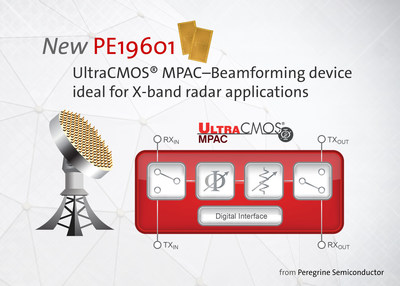Extending from 8 to 12 GHz, the UltraCMOS® PE19601 MPAC-Beamforming Device Is Ideal for X-Band Radar Applications
SAN FRANCISCO, May 24, 2016 — (PRNewswire) — IMS 2016 – In booth #2129 Peregrine Semiconductor Corp., founder of RF SOI (silicon on insulator) and pioneer of advanced RF solutions, introduces the UltraCMOS® PE19601, a monolithic phase and amplitude controller (MPAC) solution for beamforming. This new MPAC–Beamforming device covers a frequency range of 8 to 12 GHz, and it expands Peregrine's MPAC product family into higher frequencies. The PE19601 is designed for X-band radar applications including active electronically scanned array (AESA) weather, air-traffic control and military radar."Peregrine has shifted the paradigm in high frequency design," says Kinana Hussain, director of marketing at Peregrine Semiconductor. "With products like the PE19601, Peregrine has proved that RF SOI can deliver a high-performing, reliable and integrated solution at high frequencies. As the demand for high frequency applications increases, Peregrine will continue to support the future of communications with intelligently integrated solutions, like the MPAC portfolio."
Peregrine's MPAC product family showcases the intelligent integration capabilities of UltraCMOS technology. Intelligent integration is the seamless integration of RF, digital and analog components on a single chip. The PE19601 MPAC–Beamforming solution integrates a digital step attenuator, a phase shifter, RX/TX switching and a digital serial interface on a monolithic die. Through intelligent integration, the PE19601 seamlessly combines RF and analog processing with digital programmability to deliver the flexibility to tune gain and phase at fine resolution.
Peregrine's UltraCMOS technology platform also offers high reliability, repeatability and industry-leading linearity. High linearity is critical to enabling high-dynamic range, high-sensitivity radar. High-dynamic range is the radar's ability to receive a wide range of signal strengths and levels. This means the radar can be more accurate because it can detect weaker return signals. High linearity improves the sensitivity of the radar and enables the radar to better detect small objects in cluttered environments.
Ideal for high density, compact arrays, the PE19601 delivers the fine resolution and degree of control that is critical for radar applications. Radar's intelligent arrays can be optimized through increased accuracy and resolution. This performance optimization can occur within the fundamental beam pattern or by reducing unwanted interferers. When the phase accuracy and resolution of the array is low, the directionality of the beam is also low. Increasing the phase accuracy and resolution improves the directionality and the ability to focus the signal. Further fine-tuning the phase relationships of all the elements in an array can create nulling effects. These nulling effects can be leveraged to mitigate effects of interferers and help reduce the level of interference generated. The PE19601 allows for the precise and fine control of a beam's key characteristics.
Features, Packaging, Price and Availability
The PE19601 is an X-band MPAC–Beamforming device. It covers a frequency range of 8 to 12 GHz and has an extended frequency range of 6 to 14 GHz. Offered as a bare wirebond die, this MPAC–Beamforming product has high linearity of greater than 40 dBm IIP3 and high isolation of 50 dB. It delivers high power handling of 17 dBm and exhibits low power consumption of 0.001 mA. The PE19601 contains a 6-bit digital step attenuator (DSA), a 6-bit or 10-bit digital phase shifter (DPS), RX/TX switching and a digital serial interface. The DSA covers a 31.5 dB attenuation range in a 0.5 dB step with a low RMS amplitude error of 0.2 dB. The phase shifter has a 360-degree phase range with a very fine resolution of 5 degrees and RMS phase error of 2 degrees. The PE19601 maintains high attenuation and phase accuracy over frequency and temperature.
Samples and evaluation kits with software are available now. Volume production units will be available in summer 2016. Offered as a 2.6 x 4.65 mm die, the PE19601 is $39.60 each for 1k-quantity orders and $32.12 each for 5k-quantity orders.
Visit Peregrine's newsroom at www.psemi.com/newsroom for the product image and video.
|
Features |
PE19601 MPAC–Beamforming |
|
Frequency Range |
8–12 GHz |
|
Extended Frequency Range |
6–14 GHz |
|
Phase Range/Step |
360° range/5° step |
|
Low RMS Phase Error |
2° |
|
Attenuation Range/Step |
31.5 dB range/0.5 dB step |
|
Low RMS Amplitude Error |
0.2 dB |
|
High Linearity |
>40 dBm IIP3 |
|
High Isolation |
50 dB |
|
High Power Handling |
P0.1dB of +17 dBm |
|
Low Power Consumption |
0.001 mA |
|
Package |
Die |
ABOUT PEREGRINE SEMICONDUCTOR
Peregrine Semiconductor Corporation, a Murata company, is the founder of RF silicon on insulator (SOI) and is a leading fabless provider of high-performance, integrated RF solutions. Since 1988 Peregrine and its founding team have been perfecting UltraCMOS® technology—a patented, advanced form of SOI—to deliver the performance edge needed to solve the RF market's biggest challenges, such as linearity. By delivering best-in-class performance and monolithic integration, Peregrine products are the trusted choice for market leaders in automotive, broadband, industrial, Internet of Things, mobile devices, smartphones, space, test-and-measurement equipment and wireless infrastructure. A Murata company since December 2014, Peregrine holds more than 240 filed and pending patents and has shipped over 3.5 billion UltraCMOS units. For more information, visit
http://www.psemi.com.
The Peregrine Semiconductor name, logo, and UltraCMOS are registered trademarks of Peregrine Semiconductor Corporation in the U.S.A., and other countries. All other trademarks mentioned herein are the property of their respective owners.
Editorial Contact:
Elizabeth Brown
Peregrine Semiconductor
Phone: 619.993.4648
Email Contact









